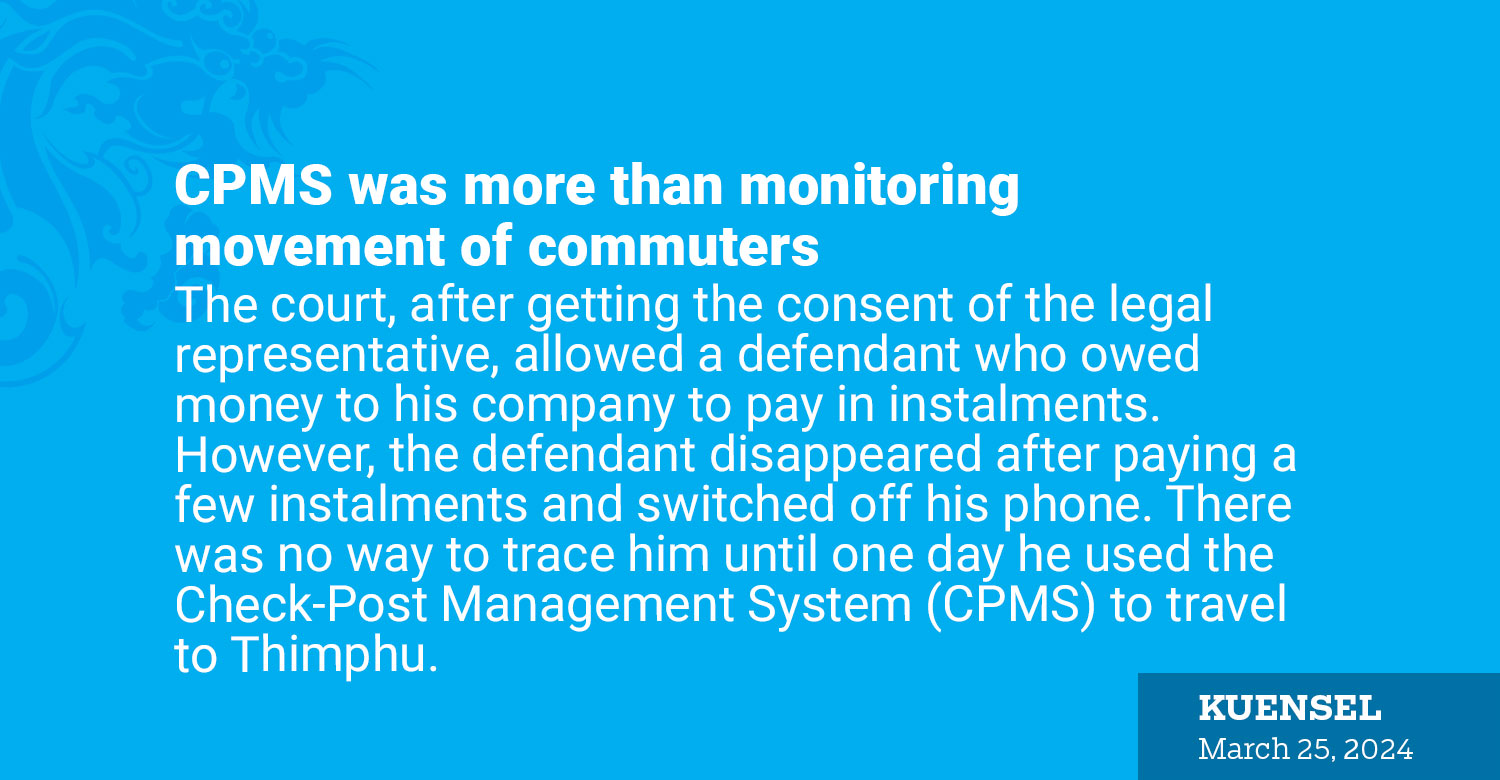Facility lifted from nine check posts to ease convenience
Dechen Dolkar
The court, after getting the consent of the legal representative, allowed a defendant who owed money to his company to pay in instalments. However, the defendant disappeared after paying a few instalments and switched off his phone. There was no way to trace him until one day he used the Check-Post Management System (CPMS) to travel to Thimphu.
His whereabouts were traced with the help of police and the dues settled. The CPMS lifted recently from several check posts, although intended to monitor people and vehicle movement, had come handy to many authorities. CPMS was developed in September 2020 in response to the challenges posed by the Covid-19 pandemic and implemented to track the movement of people and vehicles within the Dzongkhags across the country, effectively aiding pandemic control efforts.
The threat from coronavirus is over, but the CPMS continued and it helped authorities like the police, the Royal Audit Authority (RAA) and other institutions who used it to aid their management systems.
Kuensel learnt that CPMS became an effective tool for the Royal Bhutan Police in tracking and arresting individuals (with arrest warrants) who are involved in monetary or civil cases in court. The system has aided in contact tracing and significantly facilitated their tasks. For the traffic police, CPMS helped in tracing vehicles involved in accidents, making it easier to locate missing persons.
There are reports of police officials being questioned when people involved in monetary cases travel to districts without using the CPMS. “It really helped us track people on the run after borrowing money,” said a woman who called Kuensel to complain a couple of months ago.
Monitoring official tours
The RAA in collaboration with the police used CPMS to fact-check travel allowance and daily allowance claims of civil servants for the last three years. RAA officials said they observed that civil servants have claimed travel allowance (TA) and daily allowance (DA) without actually leaving on tour. They also found some civil servants claiming allowances for one to two extra days before or after departing to the tour destinations.
“CMPS helped find inconsistencies between the details of travel claims and CPMS data and approving authority accepting incorrect claims,” said the official.
On the concern of breach of privacy, the official said the RAA, as an institution, utilized CPMS for public interest, as audit procedures demand cross-verification of information. “The CPMS being authentic data was used for officials’ travel and not for private travel.”
Auditors said that with the help of CPMS, they manage to make people refund a significant amount from false or incorrect travel claims. It was learned that the audit recovered around Nu 20 million to Nu 25 million in a year with the help of CPMS from travel claims.
The system had also been useful to taxi drivers who said the system was a default safety measure for them. A taxi driver, Nidup, said that CPMS was beneficial for taxi drivers and public transport drivers since they ferry all kinds of passengers. He said that they may unknowingly be ferrying illegal persons, placing them at risk.
“CPMS also made locating accident sites and details of passengers in case of any accident easier,” he said.
CPMS facility lifted citing inconvenience
Despite the advantages, the CPMS were lifted from nine check posts in eight dzongkhags. The facility became an issue in the parliament where members of parliament raised concerns about the inconvenience caused to commuters.
The Home Minister, Lyonpo Tshering, said that even as restrictions began to ease with improvements in the situation, the implementation of CPMS continued until recently, as it proved efficient in managing the movement of vehicles and people.
Lyonpo said that since the Covid-19 pandemic is now under full control, the use of CPMS for the prevention of Covid-19 outbreaks is no longer relevant. However, Lyonpo said that the use of CPMS will continue for managing the movement of people and vehicles transiting through international border checkpoints and Bumpagang ICP to travel from one part of the country to another.
Except for some establishment costs at the initial stage, there are no running costs involved. However, certain fees are applicable for the renewal or updation of the system, which are negligible.


